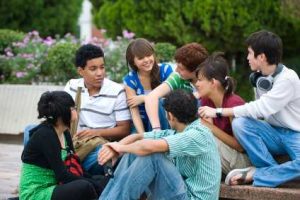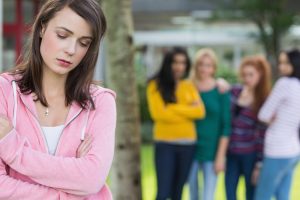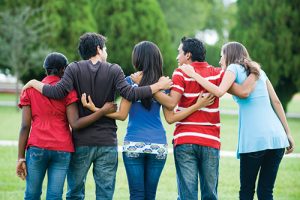 What do we study in the Child and Adolescent Relationship Lab?
What do we study in the Child and Adolescent Relationship Lab?
There are several on-going projects in the Child and Adolescent Relationships Laboratory. Below are brief descriptions of the projects. If you would like additional information about these projects and/or would like become involved in these projects, please contact Dr. Julie Bowker at jcbowker@buffalo.edu.
Teen Relationships in Place (TRIP) Project
Very little is known about young adolescent experiences with friends and peers outside the structured school context. Funded by the NSF, and in collaboration with Dr. Ryan Adams (University of Cincinnati, College of Medicine), this 3-year study seeks to bring additional clarity to the features and psychological experiences of best friendships and victimization across context. Sixth- and seventh-grade participants are asked to report on their experiences in different locations (i.e., school, home, neighborhood, online, extracurricular activities) and at different times (i.e., time of year, day, and week). We hope to better understand the significance of context to positive and negative peer experiences, as well as the impact of such experiences on adolescent psychological well-being.
Older Age Study in Solitude (OASIS)
Prior findings suggest the impact of solitude on well-being in adulthood is nuanced—where those who enjoy spending time alone are less likely to experience the psychological distress often associated with solitude. Funded by SSHRC, and in collaboration with Dr. Rob Coplan (Carleton University, Canada), this study seeks to probe relations between solitude and well-being in older adults. We aim to explore whether individual factors (e.g., enjoyment in solitude) and environmental differences (e.g., social support, activity engagement) buffer the psychological impact (e.g., loneliness, happiness, life satisfaction) of time spent alone.
Coronavirus Outbreak Parenting and Emotions Study (COPES)
Theory and empirical evidence strongly support the transactional nature between ecologically based stressors, such as lack of social support or financial insecurity, and family functioning, such as parent-child relationships. Therefore, contextual stressors outside of the home pose a significant indirect risk to child emotional and behavioral well-being vis-à-vis parenting stress, parental relationships, parental social support, and changes in parenting behaviors and this is predictive of maladjustment across several domains, including socio-emotional, peer, and academic functioning. Families are currently experiencing an unprecedented, extremely stressful event in the face of the COVID-19 pandemic that is likely to influence parent-child interactions and both parent and child adjustment in a myriad of ways that may promote either ongoing risk or resilience. The COPES project, in collaboration with Dr. Ken Rubin and several national and international colleagues, responds to a worldwide collective call to examine the effects of COVID-19 on parents’ and children’s emotional and behavioral adjustment.
The Solitude Paradox: Causes and Consequences of Seeking Time Alone in Childhood and Adolescence Project
Many children, adolescents, and young adults have a somewhat conflicted relationship with solitude. They desire time alone because it can often be restorative and provide much needed opportunities for self-reflection and personal growth. At the same time, the experience of being alone can also lead to more unpleasant thoughts and feelings, ranging from simple boredom to more profound loneliness and emotional pain. This somewhat contradictory phenomenon has been described as the Paradox of Solitude. Funded by SSHRC, and in collaboration with Dr. Rob Coplan (Carleton University, Canada), this 5-year study (beginning in August 2017) seeks to bring additional clarity to these issues by more closely examining the potential causes and consequences of seeking solitude in childhood, adolescence, and young adulthood.
Parental Beliefs about Solitude Project
A growing body of literature suggests that time spent engaged in solitary activities is increasing in childhood and adolescence. In addition, it is also likely that there are developmental changes in attitudes towards being alone as well as developmental changes related to the consequences of being alone. Funded by SSHRC, and in collaboration with Dr. Rob Coplan (Carleton University, Canada), this project seeks to extend understanding of the benefits, risks, and development of solitude across a wide range of developmental age periods. In addition, we are interested in developmental differences in parental beliefs about the costs and benefits of solitude across childhood and adolescence and the parental characteristics that may be associated with such beliefs. Parents who are interested in participating in this study can click here: Parental Beliefs about Solitude
Beliefs about Social Withdrawal Project

It has long been assumed that the reason that shy, unsociable and avoidant youth are rejected, excluded, and victimized by their peers is because their behaviors are judged to be atypical and non-normative. Solitary behaviors are thought to contrast sharply with social norms and expectations for peer interaction and group involvement. However, no studies have actually tested these ideas. Understanding the reasons for socially withdrawn youths’ peer difficulties has important implications for clinical intervention and prevention efforts as well as etiological theories of social withdrawal. Thus, in this project, we are evaluating a newly-developed measure regarding beliefs about different types of social withdrawal. In collaboration with Dr. Rob Coplan (Carleton University, Canada), the measure was piloted with college students, with plans to utilize the measure with children and young adolescents in the near future.
Past Projects:
University at Buffalo Friendship Project
For this project, young adolescents and their friends visited the Child and Adolescent Relationships Laboratory to complete some tasks together (which were video-taped) and also completed additional questionnaires about their close relationships and their thoughts and feelings. The overarching goal of this project was to better understand the ways in which young adolescents interact with their best friends, and how such interactions can explain variability in their psychological well-being.
My Friends & Feelings Study
During early adolescence, friendships are unique influencers of adjustment during a time in development when peer experiences become increasingly important and impactful. In this project, middle school students responded to self-report and peer nomination measures over a brief longitudinal period to help increase our understanding of how middle school students’ friendships impact their socio-emotional well-being.
The Meaning of Social Behaviors and Peer Relationships in Different Cultures Project
In collaboration with Dr. Ken Rubin (University of Maryland), Dr. Radhi Raja (Uni-SIM, Singapore), Dr. Busola Ojo (University of Lagos, Nigeria) and Dr. Jamie Ostrov (University at Buffalo), this project focused on understanding how the meaning of different social behaviors, such as shy/withdrawn behavior or relationally aggressive behavior, and also peer relationship experiences, may vary depending on the larger cultural context. Late adolescents in Buffalo, NY, Lagos, Nigeria and Singapore have participated in this project.
This project was also extended to Hubli, India, in collaboration with Dr. Shanmukh Kamble (Karnatak University, India). In this longitudinal project, young adolescents compled self-report measures of social withdrawal, psychological well-being, self-conscious emotions, and friendship, as well as peer nomination items assessing various peer experiences (e.g., popularity, peer rejection).

